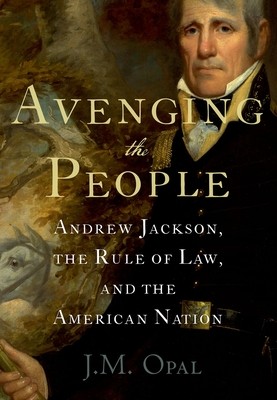
- We will send in 10–14 business days.
- Author: J M Opal
- Publisher: Oxford University Press, USA
- ISBN-10: 0190088389
- ISBN-13: 9780190088385
- Format: 15.5 x 23.4 x 2.5 cm, softcover
- Language: English
- SAVE -10% with code: EXTRA
Reviews
Description
Most Americans know Andrew Jackson as a frontier rebel against political and diplomatic norms, a "populist" champion of ordinary people against the elitist legacy of the Founding Fathers. Many date the onset of American democracy to his 1829 inauguration.
Despite his reverence for the "sovereign people," however, Jackson spent much of his career limiting that sovereignty, imposing new and often unpopular legal regimes over American lands and markets. He made his name as a lawyer, businessman, and official along the Carolina and Tennessee frontiers, at times ejecting white squatters from native lands and returning slaves to native planters in the name of federal authority and international law. On the other hand, he waged total war on the Cherokees and Creeks who terrorized western settlements and raged at the national statesmen who refused to "avenge the blood" of innocent colonists. During the long war in the south and west from 1811 to 1818 he brushed aside legal restraints on holy genocide and mass retaliation, presenting himself as the only man who would protect white families from hostile empires, "heathen" warriors, and rebellious slaves. He became a towering hero to those who saw the United States as uniquely lawful andvictimized. And he used that legend to beat back a range of political, economic, and moral alternatives for the republican future. Drawing from new evidence about Jackson and the southern frontiers, Avenging the People boldly reinterprets the grim and principled man whose version of American nationhood continues to shape American democracy.
EXTRA 10 % discount with code: EXTRA
The promotion ends in 18d.05:31:59
The discount code is valid when purchasing from 10 €. Discounts do not stack.
- Author: J M Opal
- Publisher: Oxford University Press, USA
- ISBN-10: 0190088389
- ISBN-13: 9780190088385
- Format: 15.5 x 23.4 x 2.5 cm, softcover
- Language: English English
Most Americans know Andrew Jackson as a frontier rebel against political and diplomatic norms, a "populist" champion of ordinary people against the elitist legacy of the Founding Fathers. Many date the onset of American democracy to his 1829 inauguration.
Despite his reverence for the "sovereign people," however, Jackson spent much of his career limiting that sovereignty, imposing new and often unpopular legal regimes over American lands and markets. He made his name as a lawyer, businessman, and official along the Carolina and Tennessee frontiers, at times ejecting white squatters from native lands and returning slaves to native planters in the name of federal authority and international law. On the other hand, he waged total war on the Cherokees and Creeks who terrorized western settlements and raged at the national statesmen who refused to "avenge the blood" of innocent colonists. During the long war in the south and west from 1811 to 1818 he brushed aside legal restraints on holy genocide and mass retaliation, presenting himself as the only man who would protect white families from hostile empires, "heathen" warriors, and rebellious slaves. He became a towering hero to those who saw the United States as uniquely lawful andvictimized. And he used that legend to beat back a range of political, economic, and moral alternatives for the republican future. Drawing from new evidence about Jackson and the southern frontiers, Avenging the People boldly reinterprets the grim and principled man whose version of American nationhood continues to shape American democracy.


Reviews